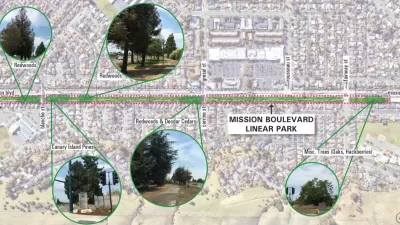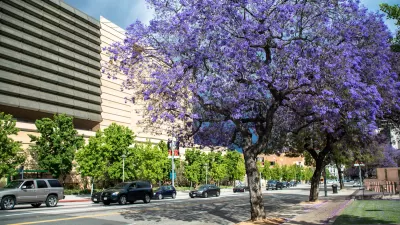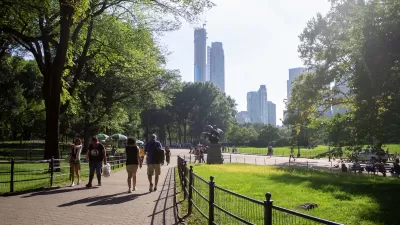A new study shows that regular exposure to trees and green spaces has a powerful impact on depression and mental health.

In a piece for The Guardian, Ashley Stimpson reports on new research that shows the importance of tree cover in urban neighborhoods and draws attention to the "tree inequity" that plagues many low-income communities.
"In many cities, a map of urban tree cover reflects the geography of race and income," Stimpson writes. Historic redlining, blamed for housing inequities and disinvestment, also has a significant impact on a neighborhood's trees—or lack thereof. "According to the US Forest Service, previously redlined areas have an average of 23% tree cover, while once-greenlined neighborhoods, living up to their old label, have an average of 43% tree cover."
Trees aren't just about aesthetics: studies show that they mitigate the urban heat island effect and boost residents' physical and mental health. "Summer days in East Baltimore neighborhoods," which are predominantly Black, historically redlined, and lack extensive tree cover, "can be four to 16 degrees hotter than other parts of the city." In such neighborhoods, residents face the risk of heat-related illnesses, higher cooling costs, and poorer air quality.
Now, research is zeroing in on the mental health effects of city trees. Using "the correlation between prescription antidepressants and tree cover across a range of neighborhoods," a group of researchers in Germany "were able to demonstrate in more material terms than ever before the correlation between trees and mental wellness." Their findings show that having trees within 100 meters of one's home is associated with reduced antidepressant use, a relationship "especially pronounced in residents with low socioeconomic status." The study's authors suggests that "'unintentional' everyday contact" with nature and "easily accessible urban green space" can have a noticeable positive impact on public health.
FULL STORY: Green health: a tree-filled street can positively influence depression, study finds

Planetizen Federal Action Tracker
A weekly monitor of how Trump’s orders and actions are impacting planners and planning in America.

Maui's Vacation Rental Debate Turns Ugly
Verbal attacks, misinformation campaigns and fistfights plague a high-stakes debate to convert thousands of vacation rentals into long-term housing.

San Francisco Suspends Traffic Calming Amidst Record Deaths
Citing “a challenging fiscal landscape,” the city will cease the program on the heels of 42 traffic deaths, including 24 pedestrians.

Amtrak Rolls Out New Orleans to Alabama “Mardi Gras” Train
The new service will operate morning and evening departures between Mobile and New Orleans.

The Subversive Car-Free Guide to Trump's Great American Road Trip
Car-free ways to access Chicagoland’s best tourist attractions.

San Antonio and Austin are Fusing Into one Massive Megaregion
The region spanning the two central Texas cities is growing fast, posing challenges for local infrastructure and water supplies.
Urban Design for Planners 1: Software Tools
This six-course series explores essential urban design concepts using open source software and equips planners with the tools they need to participate fully in the urban design process.
Planning for Universal Design
Learn the tools for implementing Universal Design in planning regulations.
Heyer Gruel & Associates PA
JM Goldson LLC
Custer County Colorado
City of Camden Redevelopment Agency
City of Astoria
Transportation Research & Education Center (TREC) at Portland State University
Jefferson Parish Government
Camden Redevelopment Agency
City of Claremont





























